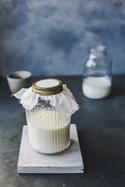|

As demand for the fermented milk drink Kefir rises, a new APC Microbiome Ireland study in mice reports that two varieties, Fr1 and UK4, had positive effects on the immune system and behavior. The research supports the recent broadening of the definition of psychobiotics to include fermented foods and could optimize future generations of kefir products. The results are among the first to clearly show effects of kefir consumption on behavior. The researchers said it is unclear whether the study results can be replicated in human trials, but more studies on the validation of kefir as a dietary intervention to improve humans’ mood are warranted.
"Kefir shows potential as psychobiotic, mouse study finds", Nutrition Insight, May 19, 2020
|
 The growing consumer interest in gut health has encouraged several beverage companies to develop new products targeting that niche. Innova data show an 11 percent rise in food and beverage launches with a digestive health claim, a 17 percent increase in launches with a “probiotic” claim, and a 10 percent growth in launches with a “fermentation” claim. Among the companies offering new products in the space are: U.S. health and wellness brand Friska, which has launched ten dietary supplements featuring digestive enzymes to improve gut health; and R's KOSO, which has launched a version of the traditional Japanese prebiotic drink koso, made by fermenting raw vegetables and fruits. The growing consumer interest in gut health has encouraged several beverage companies to develop new products targeting that niche. Innova data show an 11 percent rise in food and beverage launches with a digestive health claim, a 17 percent increase in launches with a “probiotic” claim, and a 10 percent growth in launches with a “fermentation” claim. Among the companies offering new products in the space are: U.S. health and wellness brand Friska, which has launched ten dietary supplements featuring digestive enzymes to improve gut health; and R's KOSO, which has launched a version of the traditional Japanese prebiotic drink koso, made by fermenting raw vegetables and fruits.
"Digestive enzymes in the spotlight: Brands tap into booming gut health NPD", Nutrition Insight, May 19, 2020
|
|
.jpg&width=125&height=83) New research from scientists at Loma Lind University in California claims that women who drink even one cup of dairy milk a day could increase their risk of developing breast cancer by as much as 50 percent. The study also claims that women who consumed soy in high quantities also had a high risk of breast cancer. The sex hormone content of the milk could be blamed for the rise in the risk of cancer by drinking it, said lead author Gary Fraser, who also said the observational study provides “fairly strong evidence” that dairy milk or “some factor closely related to drinking dairy” is “a cause of breast cancer in women.” But the Dairy Farmers of Canada said “the findings of this research study could be misleading.” It pointed to offsetting studies from the World Cancer Research Fund International and the International Dairy Federation (IDF), as well as a 2016 study showing that the risk of breast cancer decreased by four percent with skim milk intake. New research from scientists at Loma Lind University in California claims that women who drink even one cup of dairy milk a day could increase their risk of developing breast cancer by as much as 50 percent. The study also claims that women who consumed soy in high quantities also had a high risk of breast cancer. The sex hormone content of the milk could be blamed for the rise in the risk of cancer by drinking it, said lead author Gary Fraser, who also said the observational study provides “fairly strong evidence” that dairy milk or “some factor closely related to drinking dairy” is “a cause of breast cancer in women.” But the Dairy Farmers of Canada said “the findings of this research study could be misleading.” It pointed to offsetting studies from the World Cancer Research Fund International and the International Dairy Federation (IDF), as well as a 2016 study showing that the risk of breast cancer decreased by four percent with skim milk intake.
"Dairy milk 'associated with breast cancer risk': study", Food Navigator , February 25, 2020
|
.jpg&width=125&height=83) A little-known syndrome discovered two decades ago may win the distinction of becoming the eating disorder of the modern era. Orthorexia nervosa is defined as an unhealthy obsession with healthful eating. It often starts with a desire to eat "clean" whole foods in their natural state, but then hardens into a rigid eating style that can crowd out other activities and relationships. Though not yet recognized in the Diagnostic and Statistical Manual of Mental Disorders (DSM), that will eventually change because it “is affecting a huge segment of the population,” according to one nutrition expert. A little-known syndrome discovered two decades ago may win the distinction of becoming the eating disorder of the modern era. Orthorexia nervosa is defined as an unhealthy obsession with healthful eating. It often starts with a desire to eat "clean" whole foods in their natural state, but then hardens into a rigid eating style that can crowd out other activities and relationships. Though not yet recognized in the Diagnostic and Statistical Manual of Mental Disorders (DSM), that will eventually change because it “is affecting a huge segment of the population,” according to one nutrition expert.
"Is Orthorexia the Eating Disorder for the Digital Age?", Vogue, January 01, 2019
|